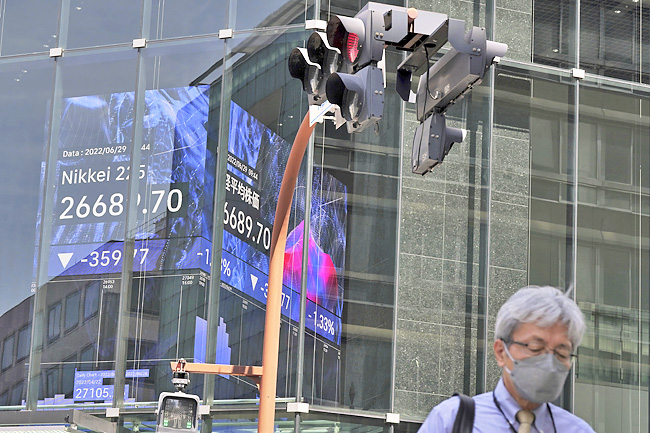BANGKOK (AP) – Shares slipped yesterday in Europe and Asia ahead of the latest update on United States (US) economic growth, while oil prices were lower.
The Commerce Department released a report on first-quarter gross domestic product later in the day. Investors worried by uncertainty over inflation, rising interest rates and the potential for a recession also were awaiting remarks by central bank leaders including Fed Chair Jerome Powell.
Germany’s DAX lost 1.2 per cent to 13,071.73, while the CAC 40 in Paris was almost unchanged at 6,049.31. Britain’s FTSE 100 shed 0.5 per cent to 7,287.26. The futures for the Dow industrials and S&P 500 were up 0.1 per cent.
On Tuesday, the S&P 500 fell two per cent, the Dow Jones Industrial Average fell 1.6 per cent, and the Nasdaq fell three per cent after a survey showed weaker than expected consumer confidence in the US, mainly due to surging prices.
A weaker-than-expected US consumer confidence reading highlighted worsening consumer expectations due to persistently high inflation.
“All regions, countries, industries, and stocks are getting printed red with broad strokes. It is not looking pretty, and trading the bad news is good news theory could end in tears,” Stephen Innes of SPI Asset Management said in a report.
Tokyo’s Nikkei 225 index lost 0.9 per cent to 26,804.60 while the Kospi in Seoul fell 0.8 per cent to 2,377.99. The Hang Seng in Hong Kong declined 1.9 per cent to 21,996.89. The Shanghai Composite index sank 1.4 per cent to 3,361.52.

Australia’s S&P/ASX 200 gave up 0.9 per cent to 6,700.20. Bangkok’s SET lost 0.5 per cent, while India’s Sensex was nearly unchanged.
The Conference Board reported on Tuesday its consumer confidence index fell in June to its lowest level in more than a year, results that were much weaker than economists expected.
Investors face a pervasive list of concerns centring around rising inflation squeezing businesses and consumers. Supply chain problems that have been at the root of rising inflation were made worse over the last several months by increased restrictions in China related to COVID-19.
Businesses have been raising prices on everything from food to clothing. Russia’s invasion of Ukraine in February put even more pressure on consumers by raising energy prices and pumping gasoline prices to record highs.
Consumers already were shifting spending from goods to services as the economy recovered from the pandemic’s impact, but the intensified pressure from inflation has prompted a sharper shift away from discretionary items like electronics to necessities.
Central banks are raising rates to temper inflation after years of holding rates down to help economic growth but investors fear they could go too far and actually push economies into a recession. Wall Street is bracing for the next round of corporate earnings in the next few weeks. They will help paint a clearer picture of how companies are dealing with the squeeze from rising costs and consumers curtailing some spending.
The yield on the 10-year Treasury note, which helps set mortgage rates, slipped to 3.15 per cent from 3.19 per cent. US benchmark crude oil slipped 14 cents to USD111.62 per barrel in electronic trading on the New York Mercantile Exchange. Brent crude lost UES0.21 cents to USD113.59 per barrel.
The dollar rose to JPY136.17 from JPY136.12 on Tuesday. The euro weakened to USD1.0513 from USD1.0522.



















































